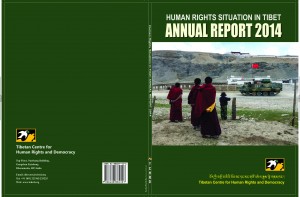 On 7 February 2015 the Tibetan Centre for Human Rights and Democracy (TCHRD) released its 2014 Annual Report on human rights situation in Tibet. The report is available in English, Tibetan, and, for the first time, Chinese.
On 7 February 2015 the Tibetan Centre for Human Rights and Democracy (TCHRD) released its 2014 Annual Report on human rights situation in Tibet. The report is available in English, Tibetan, and, for the first time, Chinese.
The Annual Report demonstrates that despite the promised reforms, the human rights situation in Tibet is continuing to deteriorate. In particular, the Annual Report highlights death in detention, collective punishment, and restrictions on the right to freedom of assembly and association. In all three areas the treatment of Tibetans has deteriorated substantially.
Tibetan prisoners are frequently subject to torture, beatings, and denial of medical care. In 2014, an increasing number of Tibetans died because of their treatment in detention. For example, Tenzin Choedrak had every bone in his feet broken before he was returned to his family on “medical parole.” He died two days later.
The PRC expanded the scope of its punishment of Tibetans by announcing that entire families and villages would be punished if there was a self-immolation protest or a person attended religious festivals. Tibetans who protested against arbitrary arrests or illegal mining in Tibet faced violent reprisals for exercising their right to freedom of assembly.
The Annual Report also highlights the consistent and systemic problems with heath care and education in Tibet. By examining China’s 2010 census data, TCHRD uncovered disturbing trends in Tibet. By most metrics, heath care in Tibetan areas is worse than almost anywhere else in the PRC. Similarly, Tibetans receive less school and that schooling is generally ineffective and inefficient. The data undermines the PRC’s claims that it has improved life in Tibet. Education and heath care for Tibetan has fallen behind other parts of the PRC.
The Political Prisoner Database was substantially improved in 2014. A special team at TCHRD made the database one of the most comprehensive Tibetan political prisoner databases in the world. The database now includes information from various sources on 2,110 known political prisoners. This number includes the 137 Tibetans who were either detained or sentenced in 2014.
The report also addresses violations of civil and political rights, including the right to privacy and the expansion of the security state, economic social and cultural rights, including the resettlement of the nomads, the developments in the international community, including statements concerning the human rights situation in Tibet at the United Nations.
To access the full text of the 2014 Annual Report, please click here
